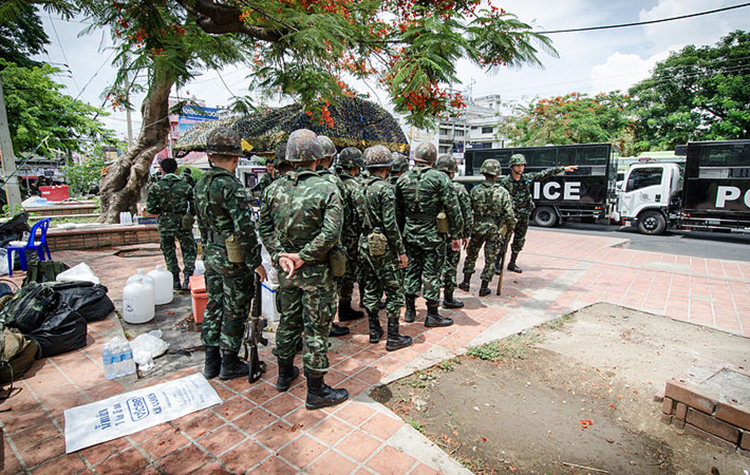(Bangkok, 3 April 2015) – The Asian Forum for Human Rights and Development (FORUM-ASIA) expressed serious concern over the introduction of a new security order invoked under Article 44 of Thailand’s interim constitution, following the revocation of martial law in the country. Article 44 legitimises the power of the head of National Council for Peace and Order (NCPO) and Prime Minister General Prayuth Chan-ocha by giving him free rein to issue any order in the name of national security, reforms, or unity regardless of the legislative, executive or judicial force of the order.
While FORUM-ASIA welcomed the lifting of martial law in Thailand, it stressed that the invocation of Article 44 of the interim constitution may further worsen the deteriorating human rights situation in the country. Particular concern was raised by FORUM-ASIA that the new order effectively allows the Prime Minister to intervene unilaterally in the face of any perceived threat to the monarchy, national security, the economy, or general state affairs.
“Any order promulgated through Article 44 is deemed legal, constitutional and conclusive. In other words, it provides absolute power to the head of NCPO without any process of checks and balances. This in itself would certainly pose a real and serious threat to the fundamental rights and freedoms of Thai people, which have been severely restricted under the Martial Law,” said Evelyn Balais-Serrano, the Executive Director of FORUM-ASIA.
According to the NCPO order no. 3/2558 (3/2015), promulgated through Article 44 of the interim constitution with immediate effect from 1 April 2015, dissidents can be detained for seven days without charge, civilians can be tried in military courts, and political gatherings with more than five people are banned under Article 44 of the interim constitution. The trial of civilians under the military court has been heavily criticised by both local rights groups and the international community. Just last week, a businessman charged with lèse-majesté was sentenced to a 50-year jail term, which was subsequently reduced to 25 years after he pleaded guilty.
The order also empowers military personnel to search, arrest, detain, summon and investigate individuals in cases related to national security or monarchy- or NCPO-related offenses without any civil or criminal liability. The vaguely-worded and overbroad provisions in the order further allow the prohibition of publications that is deemed detrimental to national security or public order, severely curtailing the right to freedom of expression in Thailand, FORUM-ASIA warned.
“All of these are in clear violation of international human rights standards. We therefore urge the Thai government to lift the enforcement of Article 44 as soon as possible and replace it with regular criminal code. All other orders from the NCPO that are not in compliance with international human rights law, especially the international treaties that Thailand has ratified, must also be revoked,” added Balais-Serrano, while reminding the Thai government of its commitment to protect and promote human rights at the recently-concluded 28th session of Human Rights Council only less than a month ago, and that it should therefore honour its own commitments.
About FORUM-ASIA:
FORUM-ASIA is a Bangkok-based regional human rights group with 47 member organizations in 16 countries across Asia. FORUM-ASIA has offices in Bangkok, Jakarta and Geneva. FORUM-ASIA addresses key areas of human rights violations in the region, including freedoms of expressions, assembly and association, human rights defenders, and democratisation.
For further inquiries, please contact:
John Liu, South & East Asia Programme Manager, [email protected] +66 802828610
Pimsiri Petchnamrob (Mook), East Asia Programme Officer, FORUM-ASIA, [email protected], +66 (0)813405409.




